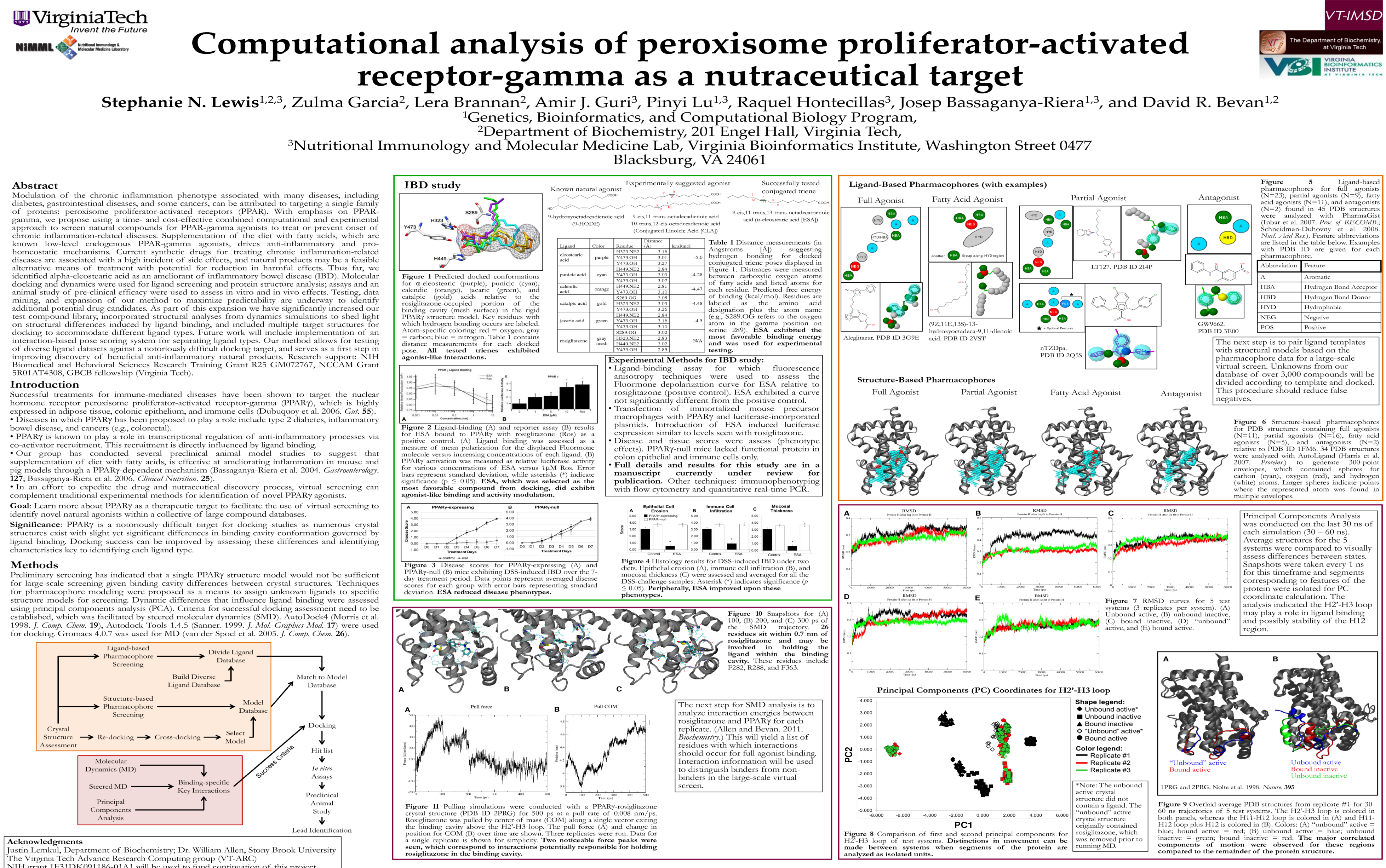Computational analysis of peroxisome proliferator-activated receptor-gamma as a nutraceutical target
Stephanie N. Lewis, Zulma Garcia, Lera Brannan, Amir J. Guri, Pinyi Lu, Raquel Hontecillas, Josep Bassaganya-Riera, and David R. Bevan
 Modulation of the chronic inflammation phenotype associated with many diseases, including diabetes, gastrointestinal diseases, and some cancers, can be attributed to targeting a single family of proteins: peroxisome proliferator-activated receptors (PPAR). With emphasis on PPAR-gamma, we propose using a time- and cost-effective combined computational and experimental approach to screen natural compounds for PPAR-gamma agonists to treat or prevent onset of chronic inflammation-related diseases. Supplementation of the diet with fatty acids, which are known low-level endogenous PPAR-gamma agonists, drives anti-inflammatory and pro-homeostatic mechanisms. Current synthetic drugs for treating chronic inflammation-related diseases are associated with a high incident of side effects, and natural products may be a feasible alternative means of treatment with potential for reduction in harmful effects. Thus far, we identified alpha-eleostearic acid as an ameliorant of inflammatory bowel disease (IBD). Molecular docking and dynamics were used for ligand screening and protein structure analysis; assays and an animal study of pre-clinical efficacy were used to assess in vitro and in vivo effects. Testing, data mining, and expansion of our method to maximize predictability are underway to identify additional potential drug candidates. As part of this expansion we have significantly increased our test compound library, incorporated structural analyses from dynamics simulations to shed light on structural differences induced by ligand binding, and included multiple target structures for docking to accommodate different ligand types. Future work will include implementation of an interaction-based pose scoring system for separating ligand types. Our method allows for testing of diverse ligand datasets against a notoriously difficult docking target, and serves as a first step in improving discovery of beneficial anti-inflammatory natural products. Research support: NIH Biomedical and Behavioral Sciences Research Training Grant R25 GM072767, NCCAM Grant 5R01AT4308, GBCB fellowship (Virginia Tech).
Modulation of the chronic inflammation phenotype associated with many diseases, including diabetes, gastrointestinal diseases, and some cancers, can be attributed to targeting a single family of proteins: peroxisome proliferator-activated receptors (PPAR). With emphasis on PPAR-gamma, we propose using a time- and cost-effective combined computational and experimental approach to screen natural compounds for PPAR-gamma agonists to treat or prevent onset of chronic inflammation-related diseases. Supplementation of the diet with fatty acids, which are known low-level endogenous PPAR-gamma agonists, drives anti-inflammatory and pro-homeostatic mechanisms. Current synthetic drugs for treating chronic inflammation-related diseases are associated with a high incident of side effects, and natural products may be a feasible alternative means of treatment with potential for reduction in harmful effects. Thus far, we identified alpha-eleostearic acid as an ameliorant of inflammatory bowel disease (IBD). Molecular docking and dynamics were used for ligand screening and protein structure analysis; assays and an animal study of pre-clinical efficacy were used to assess in vitro and in vivo effects. Testing, data mining, and expansion of our method to maximize predictability are underway to identify additional potential drug candidates. As part of this expansion we have significantly increased our test compound library, incorporated structural analyses from dynamics simulations to shed light on structural differences induced by ligand binding, and included multiple target structures for docking to accommodate different ligand types. Future work will include implementation of an interaction-based pose scoring system for separating ligand types. Our method allows for testing of diverse ligand datasets against a notoriously difficult docking target, and serves as a first step in improving discovery of beneficial anti-inflammatory natural products. Research support: NIH Biomedical and Behavioral Sciences Research Training Grant R25 GM072767, NCCAM Grant 5R01AT4308, GBCB fellowship (Virginia Tech).
